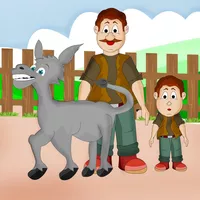The Man, the Boy and the Donkey
||||||âne
Der Mann, der Junge und der Esel
El hombre, el niño y el burro
L'homme, le garçon et l'âne
男と少年とロバ
O homem, o rapaz e o burro
Adam, Çocuk ve Eşek
Чоловік, хлопчик і осел
男人、男孩和驴子
男人、男孩和驢子
A Man and his son were once going with their Donkey to market.
||||||||||âne||
As they were walking along by its side a countryman passed them and said: ‘You fools, what is a Donkey for but to ride upon?'
|||||||||||||||imbéciles|||||||||
Alors qu'ils marchaient à côté de lui, un paysan les a croisés et a dit : 'Vous êtes des idiots, à quoi sert un âne sinon à monter dessus ?'
So the Man put the Boy on the Donkey and they went on their way.
Alors l'Homme a mis le Garçon sur l'Âne et ils ont continué leur chemin.
But soon they passed a group of men, one of whom said: ‘See that lazy youngster, he lets his father walk while he rides.'
|||||||||||||||jeune homme||||||||
Mais bientôt, ils ont croisé un groupe d'hommes, dont l'un a dit : 'Regardez ce jeune paresseux, il laisse son père marcher pendant qu'il monte.'
So the Man ordered his Boy to get off, and got on himself.
But they hadn't gone far when they passed two women, one of whom said to the other: ‘Shame on that lazy lout to let his poor little son trudge along.'
||||||||||||||||||||||||||||marcher|
Nhưng họ chưa đi được bao xa thì đi ngang qua hai người phụ nữ, một người nói với người kia: 'Thật xấu hổ cho tên lười biếng lười biếng đó khi để đứa con trai tội nghiệp của mình lê bước theo.'
Well, the Man didn't know what to do, but at last he took his Boy up before him on the Donkey.
By this time they had come to the town, and the passers-by began to jeer and point at them.
|||||||||||||||se moquer||||
À ce moment-là, ils étaient arrivés à la ville, et les passants ont commencé à se moquer d'eux et à les montrer du doigt.
The Man stopped and asked what they were scoffing at.
||||||||se moquer|
L'homme s'est arrêté et a demandé de quoi ils se moquaient.
The men said: ‘Aren't you ashamed of yourself for overloading that poor donkey of yours and your hulking son?'
|||||||||charger|||||||||
Les hommes ont dit : 'N'avez-vous pas honte de surcharger ce pauvre âne et votre fils imposant ?'
The Man and Boy got off and tried to think what to do.
Mężczyzna i chłopiec wysiedli i próbowali zastanowić się, co robić.
They thought and they thought, till at last they cut down a pole, tied the donkey's feet to it, and raised the pole and the donkey to their shoulders.
|||||||||||||||du âne|||||||||||||
Ils pensèrent et pensèrent, jusqu'à ce qu'enfin ils coupent un poteau, attachent les pattes de l'âne à celui-ci, et portent le poteau et l'âne sur leurs épaules.
Myśleli i myśleli, aż w końcu ścięli słup, przywiązali do niego nogi osła i podnieśli słup i osła na swoje ramiona.
They went along amid the laughter of all who met them till they came to Market Bridge, when the Donkey, getting one of his feet loose, kicked out and caused the Boy to drop his end of the pole.
Ils avancèrent au milieu des rires de tous ceux qui les rencontraient jusqu'à ce qu'ils arrivent au Pont du Marché, lorsque l'âne, réussissant à détacher une de ses pattes, donna un coup de pied et fit tomber le garçon de son côté du poteau.
Szli wśród śmiechu wszystkich, którzy ich spotkali, aż dotarli do Market Bridge, kiedy Osioł, poluzowawszy jedną z nóg, kopnął i spowodował, że Chłopiec upuścił swój koniec kija.
In the struggle the Donkey fell over the bridge, and his fore-feet being tied together he was drowned.
||||||||||||||||||noyé
Dans la lutte, l'âne tomba du pont, et ses pattes avant étant liées ensemble, il se noya.
W trakcie szamotaniny osioł spadł z mostu, a jego przednie łapy zostały związane, przez co utonął.
‘That will teach you,' said an old man who had followed them:
‘Cela va vous apprendre,' dit un vieil homme qui les avait suivis :
To cię nauczy - powiedział starzec, który szedł za nimi:
‘Please all, and you will please none.'
‘Faites plaisir à tous, et vous ne ferez plaisir à personne.'
"Zadowól wszystkich, a nie zadowolisz nikogo".

